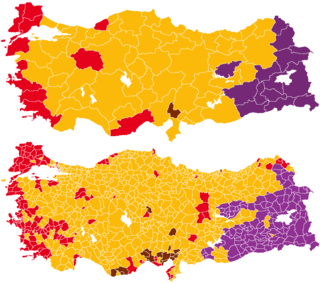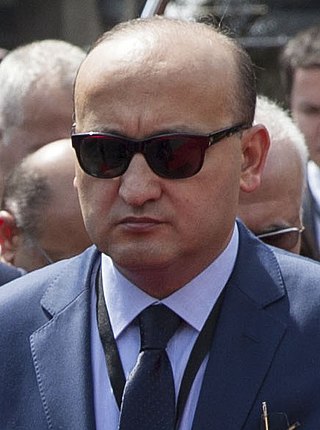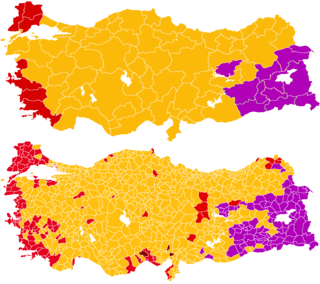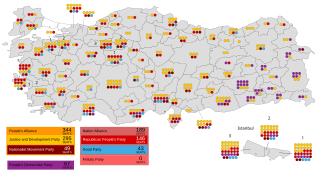
The Justice and Development Party, abbreviated officially as AK Party in English, is a political party in Turkey self-describing as conservative-democratic. It has been the ruling party of Turkey since 2002. Third-party sources often refer to the party as national conservative, social conservative, right-wing populist and as espousing neo-Ottomanism. The party is generally regarded as being right-wing on the political spectrum, although some sources have described it as far-right since 2011. It is one of the two major parties of contemporary Turkey along with the Republican People's Party (CHP).

General elections were held in Turkey on 22 July 2007 to elect 550 members to the Grand National Assembly. Originally scheduled for November, the elections were brought forward after parliament failed to elect a new president to replace Ahmet Necdet Sezer. The result was a resounding victory for the incumbent Justice and Development Party (AKP), which won 46.6% of the vote and 341 seats. The party's leader Recep Tayyip Erdoğan was consequently re-elected as Prime Minister of Turkey. The opposition Republican People's Party (CHP) came second with 20.9% of the vote and took 112 seats. The Nationalist Movement Party (MHP), which had failed to surpass the 10% election threshold in the 2002 election, re-entered parliament with 14.3% of the vote and 71 MPs. The election was fought mostly on Turkey's debate over laïcité that had been perceived to be under threat from the AKP's nomination of Foreign Minister Abdullah Gül, an Islamist politician, for the Presidency. Developments in Iraq, secular and religious concerns, the intervention of the military in political issues, European Union membership negotiations, the United States and the Muslim world were other main issues.

Mehmet Ali Şahin is a Turkish politician. He was the Speaker of the Parliament of Turkey from 2009 to 2011.

Mehmet Şimşek is a Turkish politician and economist, who has been serving as the Minister of Treasury and Finance since 4 June 2023. He was the Deputy Prime Minister of Turkey from 24 November 2015 until the office's abolition on 9 July 2018. He previously served as the minister of finance from 2009 to 2015, in the cabinets of Prime Ministers of Recep Tayyip Erdoğan and Ahmet Davutoğlu. As a member of the Justice and Development Party, he was elected as a Member of Parliament for Gaziantep in the 2007 general election and for Batman in the 2011 general election.

Kemal Kılıçdaroğlu is a Turkish politician who served as the leader of the Republican People's Party (CHP) from 2010 to 2023. He was Leader of the Main Opposition in Turkey between 2010 and 2023. He served as a member of parliament for Istanbul's second electoral district from 2002 to 2015, and as an MP for İzmir's second electoral district from 2015 to 2023.

Numan Kurtulmuş is a Turkish politician and academic who is currently the speaker of the Grand National Assembly.

Mevlüt Çavuşoğlu is a Turkish diplomat and politician who is currently a member of the Grand National Assembly. He also served as the Minister of Foreign Affairs of Turkey from August 2014 to August 2015, and again from 24 November 2015 to 6 June 2023.

The cabinet of Abdullah Gül took office on 19 November 2002. He succeeded to the fifth government of Bülent Ecevit.

General elections were held in Turkey on 12 June 2011 to elect the 550 members of Grand National Assembly. In accordance to the result of the constitutional referendum held in 2007, the elections were held four years after the previous elections in 2007 instead of five.

Süleyman Soylu is a Turkish politician. He is a deputy chairman of the Justice and Development Party. He previously served as the Minister of Labour and Social Security from November 2015 to August 2016 and the Minister of the Interior from August 2016 to June 2023. He is a former leader of the Democrat Party (DP).

General elections were held in Turkey on 7 June 2015 to elect 550 members to the Grand National Assembly. This was the 24th general election in the history of the Turkish Republic, electing the country's 25th Parliament. The result was the first hung parliament since the 1999 general elections. Unsuccessful attempts to form a coalition government resulted in a snap general election being called for November 2015.

Local elections were held in Turkey on 30 March 2014, with some repeated on 1 June 2014. Metropolitan and district mayors as well as their municipal council members in cities, and muhtars and "elderly councils" in rural areas were elected. In light of the controversy around the elections, it was viewed as a referendum on the government of Prime Minister Recep Tayyip Erdoğan. About 50 million people were eligible to vote.

Yalçın Akdoğan is a Turkish politician who served as Deputy Prime Minister of Turkey from 2014 to 2016. A member of the ruling Justice and Development Party (AKP), Akdoğan became a Member of Parliament representing Ankara's first electoral district at the 2011 general election and was re-elected in June 2015.

The 2014 Extraordinary Congress of the Justice and Development Party was held on 27 August 2014 in order to elect a new leader of the Justice and Development Party, the ruling political party of Turkey. It was the first extraordinary congress in the party's history, necessitated by the election of party leader Recep Tayyip Erdoğan as the 12th President of Turkey. Former Foreign Minister and Konya MP Ahmet Davutoğlu was unanimously elected unopposed as party leader. The congress marked the last public appearance of Recep Tayyip Erdoğan as Prime Minister, as he assumed the Presidency the day after. The congress took place at a time of significant change to Turkish politics, with the opposition Republican People's Party also holding an extraordinary convention on 5–6 September.

The 2003 by-election in the Province of Siirt was held on 9 March 2003 in order to elect three Members of Parliament from the eastern Turkish province of Siirt to the Grand National Assembly of Turkey. The by-election was held four months after the 2002 general election in November, which the Supreme Electoral Council of Turkey declared null and void in Siirt due to voting irregularities in the district of Pervari. The council decided on 2 December 2002 that the complaints by the local electoral authorities had influenced on the election result, thus calling a by-election.

General elections were held in Turkey on 1 November 2015 to elect 550 members to the Grand National Assembly. They were the 25th general elections in the History of the Republic of Turkey and elected the country's 26th Parliament. The election resulted in the Justice and Development Party (AKP) regaining a parliamentary majority following a 'shock' victory, having lost it five months earlier in the June 2015 general elections.
The 5th Justice and Development Party Ordinary Congress was a party convention of the governing Turkish Justice and Development Party that took place on 12 September 2015. It was held six weeks before Turkey voted in a snap general election in November 2015. The agenda included motions to alter the party's by-laws to lift the three-term limit for the party's MPs who had been elected for a third time in the June 2015 general election, as well as the establishment of a 'Founding Principles Board'.
The 4th Justice and Development Party Ordinary Congress was a party convention of the governing Turkish Justice and Development Party that took place on 30 September 2012. The congress mainly centred on the Kurdish–Turkish conflict.

The 2nd Justice and Development Party Extraordinary Congress was a party convention of the ruling Justice and Development Party of Turkey held on 22 May 2016. The congress, announced on 4 May 2016, had been long speculated by politicians and political commentators who had observed a severe deterioration in relations between Prime Minister and incumbent AKP leader Ahmet Davutoğlu and the AKP's founder and former leader, President Recep Tayyip Erdoğan. Davutoğlu announced that he would not stand for re-election as party leader.

Parliamentary elections were held in Turkey on 24 June 2018 as part of general elections, with presidential elections taking place on the same day. Originally scheduled for 27 October 2019, President Recep Tayyip Erdoğan called snap elections on 18 April after months of speculation. With the passage of a series of constitutional amendments in the 2017 referendum, the number of MPs will be increased from the previous 550 to 600. These representatives will be elected by the constituents of the 87 electoral districts of Turkey by party-list proportional representation.


















